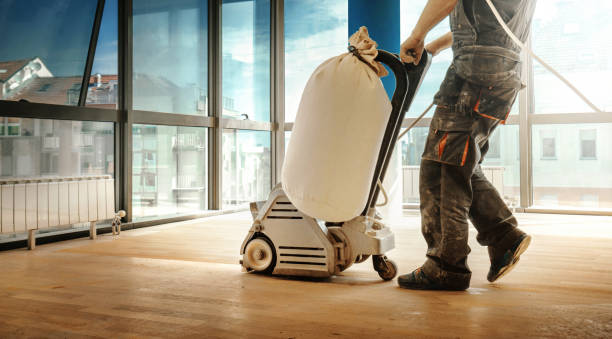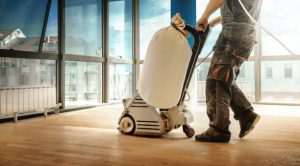The guide to professional hardwood floor cleaning

The guide to professional hardwood floor cleaning needs, like all floor coverings, to be protected and maintained throughout its life to preserve its original appearance and aesthetics.
Oiled, varnished or waxed or solid. Which protective finish to choose, which hardwood floor cleaning product to use? We will give you our expert advice to guarantee a long life for your parquet.

Parquet treatment and finishes
When laying parquet, it is necessary to protect it from stains, wear and dust. Care and treatment must be regular.
How to protect a wooden floor?
There are different protective finishes to preserve the beautiful appearance of the wood over time: oiling, vitrification (also called varnishing) or waxing.
- Vitrified parquet
The sealer creates an invisible and waterproof protective layer on the surface of the parquet. This ultra-wear and stain-resistant finish is particularly suitable for areas subject to heavy traffic, for new or old parquet, stairs, or solid parquet. Available in coloured, colourless, matte, lacquered, satin, opacifying, shiny or metallic shades, it highlights all types of wood (oak, pine, exotic wood, etc.) and even laminate. It makes your floor easy to live with and brings a slight touch of sophistication.
- Oiled parquet
Parquet oiling does not form a protective film on the surface of the parquet but on the surface of the wood. Oiled parquet offers an invisible or stained finish that is warm, natural and authentic at the same time, which preserves the essence of the wood, enhances its veining and embellishes it over time.
Waxed parquet
Parquet wax (or polish) produces a final result very close to oiled parquet. Protection is obtained by impregnating the surface of the wood with a layer of wax which cleans, shines and luster. This traditional method emphasizes the charm and character of the wood, however the finish requires regular maintenance of your parquet.
Clean a wooden floor
Parquet is a very easy floor covering to clean on a daily basis. Whatever the finish, routine cleaning comes down to dusting with a vacuum cleaner to avoid micro-scratches.
Regarding washing:
- Avoid water on oiled or waxed floors, it tends to gray the wood and stain it. Prefer a microfiber mop or a wet mop.
- On a vitrified parquet floor, the use of an appropriate parquet cleaning product is imperative to avoid the risk of clogging or damaging the protection which could then no longer block stains. When the floor is very dirty, it is advisable to use the two-bucket washing method to apply the floor cleaner or soap. Otherwise, again, just use a flat dusting broom.
How to detach a wooden floor?
There are several solutions to remove all stubborn marks and the most difficult dirt.
- On varnished parquet, use a vitrified parquet cleaner that respects the support or a parquet wipe. Very practical, it cleans gently, degreases and respects the varnish of the parquet.
- On oiled or waxed parquet, stains can be cleaned using a damp sponge and soapy water or a microfiber parquet mop.
- Ecological parquet product, just as effective, protects health and the environment. It captures dirt, grease and dust on all types of washable floors.
Maintain a wooden floor
The maintenance of wooden floors depends on the protective finish and the intensity of use. For a professional finish, use a parquet cleaning machine. The operation will indeed be more effective with a mono brush fitted with a parquet disc (sanding, waxing, polishing, etc.).
Maintain vitrified parquet
Vitrified parquet is a very hard-wearing interior coating. Its maintenance consists mainly in renovating the protection: reviving dull areas, standardizing the appearance of the blades and removing micro-scratches.
The objective is to form a protective film on the surface. Professional cleaning operation is carried out using a polish or a parquet restorer.
Maintain oiled parquet
This involves applying a maintenance oil intended to impregnate, nourish and waterproof the fibers in the surface layer. By repeating this action, the parquet is protected from dust, stains and humidity and the living and natural character of the wood is preserved.
For better protection, the surface must be prepared and cleaned before oiling the parquet. The oil will be absorbed faster and will penetrate deeper. Cleaning will then be much easier. You can also consider a light sanding beforehand to fade any stains or small marks.
Maintain a waxed floor
Maintaining the shine and luster of waxed parquet requires a little maintenance.
Steps:
- Thoroughly dust the parquet floor
- Apply a stripper to remove old layers of wax
- Apply parquet wax (liquid wax, solid wax, polish ).
- Polish the floor to make it shine.
Preparing the hardwood floor cleaning before protection
This is the baring of the wood by sanding or abrading the wood before any protective treatment. Useful for new or old parquet in poor condition or already treated (fungicide, polymers, varnish).
Sometimes it will not be possible to properly prepare the support:
- Greasy stains impregnated with the essence of the wood
- Deep scratches from initial mishandling or moving furniture
- For a new floor, wait at least two weeks for it to stabilize
The necessary equipment :
- Roller or disc sander: free surface
- Disc flagging machines: trimming
- Parquet plane
- dust vacuum cleaner
- Hammer, pliers, nail punch
- Sandpaper in strips or disks of different grits. The grade determines the number of grains per cm².
- Roughing / planning: grit 60
- Sanding / scouring: grit 80
- Finishing / Light Cleaning: 100, 120, 150 grit
Products to use:
Stain removal solvent or bleach
The step-by-step method of preparing hardwood floor cleaning
The sanding is done in 3 or 4 times, each time using a finer abrasive.
- Clear the room
- Chase nails or eliminate obstacles to sanding to avoid damaging the drum
- Choose the roughest paper first (60 grit), adjust the machine and sand
- Proceed in the same way with the other abrasive papers until complete sanding. Proceed with trimming, corners, no doors in the same way
- When finished, complete suction. The complete dusting of the grooves, baseboards, high surfaces is essential for the subsequent treatment
- Do not start the machine directly on the wood. Run it empty and only apply it while moving forward, to avoid the formation of a “hollow” in the parquet during start-up.
Good to know :
- Work in the direction of the wood grain
- Immediately change any torn or clogged paper
- Let the dust settle. Allow a rest period between 2 aspirations
- Prior impregnation of the softwoods with a pore filler prevents splinters, makes the wood more compact, prevents the boards from sticking.
Read More: Look out for some benefits of termite control professionals





